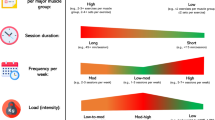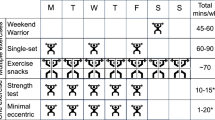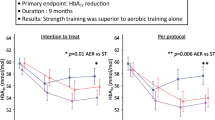Abstract
The number of people with obesity continues to increase. Bariatric surgery is the most effective treatment for severe obesity. However, this surgery also has disadvantages, such as an increased risk of excessive loss of fat-free mass, lean body mass, and muscle mass compared to other weight loss interventions. PubMed and Cochrane Library database including articles in English, Dutch, French, and German were used. From the 3609 retrieved references, 20 articles were selected. Compared with the control group, physical exercise improved body mass index (5 of 13 articles), weight loss (7 of 17 articles), functional capacity (2 of 5 articles), muscle strength (1 of 1 article), fat-free mass (3 of 5 articles), cardiorespiratory endurance (4 of 6 articles), and quality of life (2 of 4 articles) in obese patients undergoing BS. Current data is suggestive of positive effects of exercise on body mass index, weight loss, functional capacity, muscle strength, fat-free mass, cardiorespiratory endurance, and quality of life in obese patients undergoing bariatric surgery. However, our conclusions are limited because of the heterogeneity of programs and short studies. Further research is needed to determine the most effective physical exercise program in peri-bariatric surgery.
Graphical abstract


Similar content being viewed by others
References
Wolfe BM, Kvach E, Eckel RH. Treatment of obesity. Circ Res. 2016;118(11):1844–55. https://doi.org/10.1161/circresaha.116.307591.
Chaston TB, Dixon JB, O’Brien PE. Changes in fat-free mass during significant weight loss: a systematic review. Int J Obes (Lond). 2007;31:743–50.
Levitt DG, Beckman LM, Mager JR, Valentine B, Sibley SD, Beckman TR, Earthman CP. Comparison of DXA and water measurements of body fat following gastric bypass surgery and a physiological model of body water, fat, and muscle composition. J Appl Physiol. 2010;109:786–95. https://doi.org/10.1152/japplphysiol.00278.2010.
Lyytinen T, Liikavainio T, Paakkonen M, Gylling H, Arokoski JP. Physical function and properties of quadriceps femoris muscle after bariatric surgery and subsequent weight loss. J Musculoskelet Neuronal Interact. 2013;13:329–38.
Huck CJ. Effects of Supervised Resistance Training on Fitness and Functional Strength in Patients Succeeding Bariatric Surgery. J Strength Cond Res. 2015;29(3):589–95. https://doi.org/10.1519/jsc.0000000000000667.
Sjöström L, Lindroos AK, Peltonen M, Swedish Obese Subjects Study Scientific Group, et al. Lifestyle, diabetes, and cardiovascular risk factors 10 years after bariatric surgery. N Engl J Med. 2004;351:2683–93.
Magro DO, Geloneze B, Delfini R, Pareja BC, Callejas F, Pareja JC. Long-term weight regain after gastric bypass: a 5-year prospective study. Obes Surg. 2008;18:648–51.
Donnelly JE, Blair SN, Jakicic JM, Manore MM, Rankin JW, Smith BK. Appropriate physical activity intervention strategies for weight loss and prevention of weight regain for adults. Med Sci Sports Exerc. 2009;41(2):459–71. https://doi.org/10.1249/mss.0b013e3181949333.
Ballor DL, Katch VL, Becque MD, Marks CR. Resistance weight training during caloric restriction enhances lean body weight maintenance. Am J Clin Nutr. 1988;47:19–25.
Geliebter A, Maher MM, Gerace L, Gutin B, Hyemsfield SB, Hashim SA. Effects of strength or aerobic training on body composition, resting metabolic rate, and peak oxygen consumption in obese dieting subjects. Am J Clin Nutr. 1997;66:557–63.
Farrell SW, Braun L, Barlow CE, Cheng YJ, Blair SN. The relation of body mass index, cardiorespi- ratory fitness, and all-cause mortality in women. Obes Res. 2002;10(6):417–23.
Baillot A, Mampuya WM, Dionne IJ, Comeau E, Méziat-Burdin A, Langlois M-F. Impacts of supervised exercise training in addition to interdisciplinary lifestyle management in subjects awaiting bariatric surgery: a randomized controlled study. Obes Surg. 2016;26(11):2602–10. https://doi.org/10.1007/s11695-016-2153-9.
Baillot A, Vallée C-A, Mampuya WM, Dionne IJ, Comeau E, Méziat-Burdin A, Langlois M-F. Effects of a pre-surgery supervised exercise training 1 year after bariatric surgery: a randomized controlled study. Obes Surg. 2017;28(4):955–62. https://doi.org/10.1007/s11695-017-2943-8.
Bond DS, Thomas JG, Vithiananthan S, Unick J, Webster J, Roye GD, … Sax HC. Intervention-related increases in preoperative physical activity are maintained 6- months after bariatric surgery: results from the bari-active trial. Int J Obes. 2016;41(3):467–70. https://doi.org/10.1038/ijo.2016.237.
Bond DS, Thomas JG, King WC, Vithiananthan S, Trautvetter J, Unick JL, … Wing RR. Exercise improves quality of life in bariatric surgery candidates: results from the Bari-Activetrial. Obesity. 2015;23(3):536–42. https://doi.org/10.1002/oby.20988.
Carnero EA, Dubis GS, Hames KC, Jakicic JM, Houmard JA, Coen PM, Goodpaster BH. Randomized trial reveals that physical activity and energy expenditure are associated with weight and body composition after RYGB. Obesity. 2017;25(7):1206–16. https://doi.org/10.1002/oby.21864.
Castello V, Simões RP, Bassi D, Catai AM, Arena R, Borghi-Silva, . Impact of aerobic exercise training on heart rate variability and functional capacity in obese women after gastric bypass surgery. Obes Surg. 2010;21(11):1739–49. https://doi.org/10.1007/s11695-010-0319-4.
Castello-Simões V, Polaquini Simões R, Beltrame T, Bassi D, Maria Catai A, Arena R, … Borghi-Silva A. Effects of aerobic exercise training on variability and heart rate kinetic during submaximal exercise after gastric bypass surgery – a randomized controlled trial. Disabil Rehabil. 2012;35(4):334–42. https://doi.org/10.3109/09638288.2012.694575.
Coen PM, Menshikova EV, Distefano G, Zheng D, Tanner CJ, Standley RA, … Goodpaster BH. Exercise and weight loss improve muscle mitochondrial respiration, lipid partitioning, and insulin sensitivity after gastric bypass surgery. Diabetes. 2015;64(11):3737–50. https://doi.org/10.2337/db15-0809.
Coen PM, Tanner CJ, Helbling NL, Dubis GS, Hames KC, Xie H, … Goodpaster BH. Clinical trial demonstrates exercise following bariatric surgery improves insulin sensitivity. J Clin Investig. 2014;125(1):248–57. https://doi.org/10.1172/jci78016.
Coleman KJ, Caparosa SL, Nichols JF, Fujioka K, Koebnick C, McCloskey KN, … Levy SS. Understanding the capacity for exercise in post-bariatric patients. Obes Surg. 2016;27(1):51–8. https://doi.org/10.1007/s11695-016-2240-y.
Daniels P, Burns RD, Brusseau TA, Hall MS, Davidson L, Adams TD, Eisenman P. Effect of a randomised 12-week resistance training programme on muscular strength, cross-sectional area and muscle quality in women having undergone Roux-en-Y gastric bypass. J Sports Sci. 2017;36(5):529–35. https://doi.org/10.1080/02640414.2017.1322217.
Hassannejad A, Khalaj A, Mansournia MA, Rajabian Tabesh M, Alizadeh Z. The effect of aerobic or aerobic-strength exercise on body composition and functional capacity in patients with bmi ≥35 after bariatric surgery: a randomized control trial. Obes Surg. 2017;27(11):2792–801. https://doi.org/10.1007/s11695-017-2717-3.
Herring LY, Stevinson C, Carter P, Biddle SJH, Bowrey D, Sutton C, Davies MJ. The effects of supervised exercise training 12–24 months after bariatric surgery on physical function and body composition: a randomised controlled trial. Int J Obes. 2017;41(6):909–16. https://doi.org/10.1038/ijo.2017.60.
Mundbjerg LH, Stolberg CR, Cecere S, Bladbjerg E-M, Funch-Jensen P, Gram B, Juhl CB. Supervised physical training improves weight loss after Roux-en-Y gastric bypass surgery: a randomized controlled trial. Obesity. 2018;26(5):828–37. https://doi.org/10.1002/oby.22143.
Nunez Lopez YO, Coen PM, Goodpaster BH, Seyhan AA. Gastric bypass surgery with exercise alters plasma microRNAs that predict improvements in cardiometabolic risk. Int J Obes. 2017;41(7):1121–30. https://doi.org/10.1038/ijo.2017.84.
Shah M, Snell PG, Rao S, Adams-Huet B, Quittner C, Livingston EH, Garg A. High-volume exercise program in obese bariatric surgery patients: a randomized, controlled trial. Obesity. 2011;19(9):1826–34. https://doi.org/10.1038/oby.2011.172.
Stolberg CR, Mundbjerg LH, Bladbjerg E-M, Funch-Jensen P, Gram B, Juhl CB. Physical training following gastric bypass: effects on physical activity and quality of life—a randomized controlled trial. Qual Life Res. 2018. https://doi.org/10.1007/s11136-018-1938-9.
Stolberg CR, Mundbjerg LH, Funch-Jensen P, Gram B, Juhl CB, Bladbjerg E-M. Effects of gastric bypass followed by a randomized study of physical training on markers of coagulation activation, fibrin clot properties, and fibrinolysis. Surg Obes Relat Dis. 2018;14(7):918–26. https://doi.org/10.1016/j.soard.2018.03.022.
Woodlief TL, Carnero EA, Standley RA, Distefano G, Anthony SJ, Dubis G, S.,... Goodpaster, B. H. . Dose response of exercise training following Roux-en-Y gastric bypass surgery: a randomized trial. Obesity. 2015;23(12):2454–61. https://doi.org/10.1002/oby.21332.
Baillot A, Mampuya WM, Comeau E, Méziat-Burdin A, Langlois MF. Feasibility and impacts of supervised exercise training in subjects with obesity awaiting bariatric surgery: a pilot study. Obes Surg. 2013;23(7):882–91. https://doi.org/10.1007/s11695-013-0875-5.
Cashin AG, et al. Clinimetrics: Physiotherapy Evidence Database (PEDro) Scale. J Physiother. 2020;66(1):59.
Wortman PM. Evaluation research: a methodological perspective. Annu Rev Psychol. 1983;34(1):223–60. https://doi.org/10.1146/annurev.ps.34.020183.001255.
Pouwels S, Wit M, Teijink JAW, Nienhuijs SW. Aspects of exercise before or after bariatric surgery: a systematic review. Obes Facts. 2015;8(2):132–46. https://doi.org/10.1159/000381201.
Egberts K, Brown WA, Brennan L, O’Brien PE. Does exercise improve weight loss after bariatric surgery? A systematic review Obesity surgery. 2012;22:335–41.
Stegen S, Derave W, Calders P, Van Laethem C, Pattyn P. Physical fitness in morbidly obese patients: effect of gastric bypass surgery and exercise training. Obes Surg. 2011;21:61–70.
Tompkins J, Bosch PR, Chenowith R, et al. Changes in functional walking distance and health-related quality of life after gastric bypass surgery. Phys Ther. 2008;88:928–35.
Willis LH, Slentz CA, Bateman LA, Shields AT, Piner LW, Bales CW, et al. Effects of aerobic and/or resistance training on body mass and fat mass in overweight or obese adults. J Appl Physiol (Bethesda, Md: 1985) . 2012;113:1831–7.
Metcalf B, Rabkin RA, Rabkin JM, Metcalf LJ, Lehman-Becker LB. Weight loss composition: the effects of exercise following obesity surgery as measured by bioelectrical impedance analysis. Obes Surg. 2005;15(2):183–6.
Webster JD, Hesp R, Garrow JS. The composition of excess weight in obese women estimated by body density, total body water and total body potassium. Hum Nutr Clin Nutr. 1984;38:299–306.
Stocker DJ. Management of the bariatric surgery patient. Endocrinol Metab Clin N Am. 2003;32:437–57.
Mechanick JI, Kushner RF, Sugerman HJ, et al. American Association of Clinical Endocrinologists, The Obesity Society, and American Society for Metabolic & Bariatric Surgery medical guidelines for clinical practice for the perioperative nutritional, metabolic, and nonsurgical support of the bariatric surgery patient. Obesity (Silver Spring). 2009;17(Suppl 1):S1-70 (v).
Sartorio A, Ottolini S, Agosti F, Massarini M, Lafortuna CL. Three-week integrated body weight reduction programme markedly improves performance and work capacity in severely obese patients. Eat Weight Disord. 2003;8:107–13.
Waters GS, Pories WJ, Swanson MS, et al. Long-term studies of mental health after the Greenville gastric bypass operation for morbid obesity. Am J Surg. 1991;161:154–7 (discussion 157).
van Gemert WG, Adang EM, Greve JW, Soeters PB. Quality of life assessment of morbidly obese patients: effect of weight-reducing surgery. Am J Clin Nutr. 1998;67:197–201.
Bond DS, Phelan S, Wolfe LG, Evans RK, Meador JG, Kellum JM, et al. Becoming physically active after bari- atric surgery is associated with improved weight loss and health- related quality of life. Obesity (Silver Spring). 2009;17(1):78–83. https://doi.org/10.1038/oby.2008.501.
King WC, Bond DS. The importance of preoperative and postoperative physical activity counseling in bariatric surgery. Exerc Sport Sci Rev. 2013;41(1):26–35. https://doi.org/10.1097/jes.0b013e31826444e0.
Pescatello LS, Franklin BA, Fagard R, et al. American college of sports medicine position stand. Exercise and hypertension. Med Sci Sports Exerc. 2004;36:533–53.
Villareal DT, Chode S, Parimi N, Sinacore DR, Hilton T, Armamento-Villareal R, Napoli N, Qualls C, Shah K. Weight loss, exercise, or both and physical function in obese older adults. N Engl J Med. 2011;364:1218–29.
Frimel TN, Sinacore DR, Villareal DT. Exercise attenuates the weight-loss-induced reduction in muscle mass in frail obese older adults. Med Sci Sports Exerc. 2008;40:1213–9.
Figueroa A, Arjmandi BH, Wong A, Sanchez-Gonzalez MA, Simonavice E, Daggy B. Effects of hypocaloric diet, low-intensity resistance exercise with slow movement, or both on aortic hemodynamics and muscle mass in obese postmenopausal women. Menopause. 2013;20:967–72.
Weiss EP, Racette SB, Villareal DT, Fontana L, Steger-May K, Schechtman KB, Klein S, Ehsani AA, Holloszy JO. Lower extremity muscle size and strength and aerobic capacity decrease with caloric restriction but not with exercise-induced weight loss. J Appl Physiol. 2007;102:634–40.
Ross R, Dagnone D, Jones PJ, Smith H, Paddags A, Hudson R, Janssen I. Reduction in obesity and related comorbid conditions after diet-induced weight loss or exercise-induced weight loss in men: a randomized, controlled trial. Ann Intern Med. 2000;133:92–103.
Ryan AS, Harduarsingh-Permaul AS. Effects of weight loss and exercise on trunk muscle composition in older women. Clin Interv Aging. 2014;9:395–402.
Yoshimura E, Kumahara H, Tobina T, Matsuda T, Watabe K, Matono S, Ayabe M, Kiyonaga A, Anzai K, Higaki Y, et al. Aerobic exercise attenuates the loss of skeletal muscle during energy restriction in adults with visceral adiposity. Obes Facts. 2014;7:26–35.
Chomentowski P, Dube JJ, Amati F, Stefanovic-Racic M, Zhu S, Toledo FG, Goodpaster BH. Moderate exercise attenuates the loss of skeletal muscle mass that occurs with intentional caloric restriction-induced weight loss in older, overweight to obese adults. J Gerontol A Biol Sci Med Sci. 2009;64:575–80.
Author information
Authors and Affiliations
Corresponding author
Ethics declarations
Ethics Approval
This article does not contain studies with human participants or animals performed by any of the authors.
Informed Consent
Informed consent does not apply.
Conflict of Interest
The authors declare no competing interests.
Additional information
Publisher’s Note
Springer Nature remains neutral with regard to jurisdictional claims in published maps and institutional affiliations.
Key Points
• Bariatric surgery has disadvantages such as an increased risk of excessive loss of fat-free mass, lean body mass, and muscle mass compared to other weight loss interventions.
• It seems like only in the long-term a significant intergroup difference between the control and the intervention group, would appear in weight loss, body mass index, fat-free mass, and lean body mass.
• Current data is suggestive of positive effects of exercise on body mass index, weight loss, functional capacity, muscle strength, fat-free mass, cardiorespiratory endurance, and quality of life in obese patients undergoing bariatric surgery.
Supplementary Information
Below is the link to the electronic supplementary material.
Rights and permissions
About this article
Cite this article
Schurmans, G., Caty, G. & Reychler, G. Is the Peri-Bariatric Surgery Exercise Program Effective in Adults with Obesity: a Systematic Review. OBES SURG 32, 512–535 (2022). https://doi.org/10.1007/s11695-021-05693-3
Received:
Revised:
Accepted:
Published:
Issue Date:
DOI: https://doi.org/10.1007/s11695-021-05693-3




